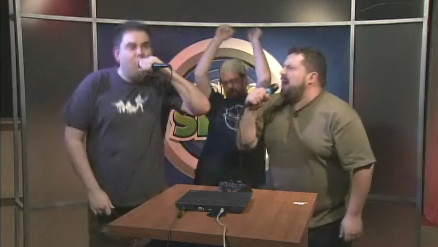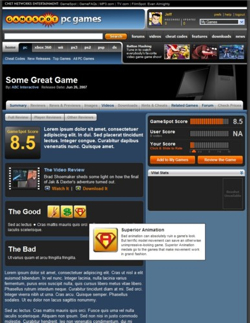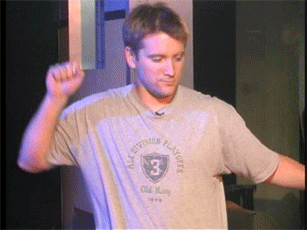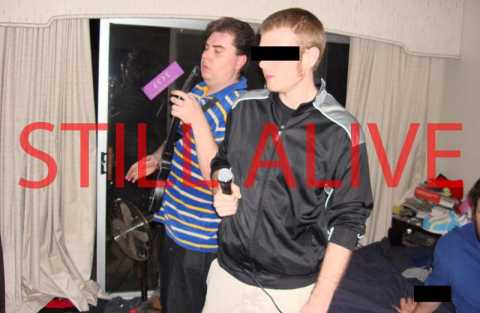God's Hand Writes a Novel
By Jensonb 3 Comments
well, you're gonna
well, you're gonna
All of the Wisdom of God's Hand in one convenient post.
jeff gerstmann is a shower in parking lot bout bangor
That about sums it up really
they are anti gravity boobs
Now, I think we all know the fun that could create. Look for anti-gravity boobs to be the big feature of the Tomb Raider after Underworld.
The following is godhand earning our ire:
Jensonb: Brad rules
rudds: it's true
godhand: not true
God's Hand, your days are numbered.
SuperMooseman: godhand blap
godhand: blap blap blap blap
...
Jayge: godhand, it's a
godhand: it will go over
those are torpedoes or prepare to fight a gigantic, singing spider-vinny
Now that is something you can say in every day life.
<SuperMooseman> godhand write me comment on my 200 The Bombing Run has a call to arms:
godhand: two face
those are torpedoes
SuperMooseman: godhand blap
godhand: blap blap blap blap
...
Jayge: godhand, it's a
godhand: it will go over
| The following is godhand earning our ire: Jensonb: Brad rules rudds: it's true godhand: not true God's Hand, your days are numbered. | |
The following is a comment I posted on Jeff's response to this, reprinted for, you know, posterity.
"The game has JK Simmons in it, as far as I'm concerned they can do what they like, that makes up for anything
But it doesn't have to cos I really don't have a problem with Jenny McCarthy"
they are anti gravity
That game looks mediocre at best. Dyack needs to learn when to keep his damn mouth shut, he's what caused this mess- not the game. However, it's not so bad that without Dyack shooting his mouth off it would have been equally as panned.
It's a video game.
(Customary: BRAP BRAP BRAP.)
Opens with a montage of the GameSpot “Golden Age”. Imagery of Rich and Jeff hosting On the Spot, the E3 coverage, the popular video reviews and so on. The opening credits are overlayed onto this, identifying the cast with their real-world counterparts. Midnight Brown's “Too Hot” plays, owing to its relation to The Hotspot and

Move onto positive coverage of Greg Kasavin's reign as Editor in Chief - forum posts, blogs and so on. This should have a voiceover in the form of Hotspot clips and audio praise from fans and compatriots.
Cut straight to Greg approaching Jeff, they get the core staff together and Greg announces his departure, naming Jeff his successor. The crew is apprehensive, but supportive of Greg's move into development. From here, we move to Greg's sign off on On the Spot. The chatroom response is shown, overwhelming disappointment. General optimism about Jeff taking over though.
From here, we move to Cnet handing control over to Jeff. He is told he will only have Editorial control, but that he has total control of that department. They appoint a suit to handle advertisers and business “so you don't have to waste yourself on it Jeff”. Jeff clearly has reservations, but agrees.
Next, Jeff and the team are prepping the review system renovation. They have clearly been working on it for a while and are just about getting ready to unveil it. Meanwhile, Jeff and Rich's popularity is emphasised by showing positive responses to On the Spot.

Larson and the suits discuss the “Jeff Problem”. They clearly don't get it, repeatedly suggesting he's unpopular, citing minor incidents. They emphasise his “lack of tact” when dealing with advertisers' products. Larson and GameSpot's ad guy decide to talk to him about it.
Jeff is in the meeting with Larson and the ad executive, accompanied by Ryan MacDonald and Ricardo Torres. The suits are unprepared for MacDonald and Torres to go on the offensive, asking why the ad team has been talking to the editors about editorial content so much lately, they cite several examples.
Once the suits recover from their shock, they explain they're worried about a lack of professional tone in the content, citing the text of the medals and demerits as well as some body text they considered “harsh”. The GameSpot trio hold them off, but it's clearly a temporary truce.
The GameSpot staff are discussing the issues they're having with the ad guys and Larson. During a pause, Rich announces his intention to leave shortly after E3. Some

The staff prepares for E3. The “GameSpot is still crazy” video plays on what is revealed to be Larson's monitor. A shadow crosses his face, but he is largely unreadable.
Jeff and Ryan MacDonald are out to lunch with Greg shortly before E3 and are reporting their problems with Larson and his cronies. Kasavin explains he was usually able to keep them at bay. He speculates that Jeff was not given the Editor in Chief job in order to weaken the GameSpot leaders' power and allow more influence from the higherups. Noone likes the sound of that.
Next, the E3 2007 coverage is briefly shown. Jeff and Rich's popularity in the community is again emphasised. This moves abruptly to Rich's final On the Spot. The staff and community's sense of loss is emphasised and many are seen to feel “First Carrie, then Greg, now Rich...At last Jeff's still here. Jeff IS GameSpot”.
The staff agree Jeff should take the On the Spot job. Vinny is tapped for The HotSpot and Button Mashing. The senior staff reiterate how important it is to emphasise the popular faces given the high profile losses of Carrie Gouskos, Kasavin and now Gallup.
The senior editors immediately head off to a meeting with the Cnet's suits. The meeting is overwhelmingly unpleasant, Larson and the ad guys are mad, they angrily demand the editorial staff “pay special attention” to triple A games. Jeff demands they take that back, GameSpot does not and will not do that, which is bias by another name. Larson gives him a cold stare “these are of course just suggestions Jeff, you're currently the Editorial Director”.
Ryan MacDonald tells Larson the editorial team will continue as is, if he has nay specific issues, he can take it up with Jeff, Ricardo or him (Ryan).
The suits depart the GameSpot office and the GameSpot crew congregate to discuss the situation. Alex and Brad sum things up as some fucked up shit which they don't like. Jeff and Ryan exchange worried looks.
Larson and the ad executives meet up in their own offices. The ad executives seem frustrated but helpless. Larson suggests that he has a solution which will scare the GameSpot staff into line and please some of the site' dissatisfied users (Ominously flash the overwhelmingly positive responses to Jeff's stuff contrasted with very minor negative reaction to emphasise Larson's cluelessness).
“Well what is it?” the ad executives ask
Larson responds easily “It's simple. Fire The Gerstmann.”

Next we show the editorial staff being disrupted by ad executives pushing their noses in over a period of time, frustrating the staff a lot. Larson keeps an overly watchful eye on the GameSpot office.
Larson and the ad executives hold another meeting. It's night and they seem to be the only executives left in the building. They discuss the preceding months and agree that something has to be done about GameSpot. One cites Eidos, who were displeased with Jeff's review of Kane and Lynch (Note: Eidos did NOT ask for Jeff to be fired). He explains he had to fight tooth and nail to keep their business, one of the biggest deal the site had. Others discuss similar problems.
Finally, Larson calls the meeting to a close, proclaiming he will dispatch Gerstmann the next week once most of the reviews are in.
The GameSpot offices are in a state of end-of-crunch-time hysteria. Work is finally slowing from it's yearly peak to virtually nothing. Plans are underway for the next On the Spot and Tournament TV's final preparation are ongoing. Jeff heads home on the night of the 28th, fairly content with the way things are headed. Note that Larson and his cronies are no longer omnipresent. The staff are too glad to find this suspicious.
The date 29 of November is emphasised as Jeff heads into work as usual. He arrives at his office door, one of the first people to get to work. He's amazed to find Larson waiting for him. He instructs Gerstmann to lock the door.
Larson proceeds to explain Cnet's issues with his tenure as Editorial Director, and tells him his services are no longer required, effective immediately. He has a lackey box up Jeff's stuff and takes him to C|Net legal where the terms of his termination including his gag order are finalised.
Jeff is told to leave Cnet's building immediately, and he does so, in a state of shock. Larson sends Jeff's things down to him, then addresses the GameSpot editorial crew, who are congregating around Ryan MacDonald for answers. He calls a meeting immediately.
Larson leads the core GameSpot Editorial Staff into a meeting room. The Editors bombard him with questions, (“what's going on?”, “why?”, what now”, why should we put up with this?”) but Larson has few answers. The overall message the staff receives from him is “this was a warning, fall into line”.
MacDonald and Torres are put in charge. Once the staff are rid of Larson's presence, MacDonald intimates that his top priority is protecting the staff. He instructs them to do their jobs, but be careful. “We're all pissed, but let's not try to be heroes.”
The senior editors continue to discuss the plan going forward. Navarro and Davis are highly demoralised, but Navarro steps up to the plate as editorial lead. Davis leaves early whilst the rest of the staff remain – not working, just talking.
Jeff picks himself up out of bed, he has apparently been crashing there for several hours. He puts some feelers out onto the internet to reassure the world that he's okay. He calls Davis who sympathises strongly. He also contacts several of the other editors. They arrange to meet up.
The editors convene at Jeff's house. They drown their sorrows and play Rock Band. The staff inform Jeff of the changes at GameSpot.

Jeff begins to receive word from potential employers as Christmas approaches. He gradually decides he wants to keep writing, then slowly decides to work with Whiskey Media on a new site.
Meanwhile, GameSpot's staff are pushing to have Larson and his lackey's removed. MacDonald is doing his best to help whilst not putting anyone's os at risk.
After new year, MacDonald has a meeting with the editors, he reiterates the new hierarchy and urges everyone to keep their heads down. Alex begins handing out assignments.
Jeff meets with Whiskey's staff and begins planning the new site. He mentions not wanting “game” in the name. Whiskey shows him around Comic Vine and Jeff begins to brainstorm ideas like the Five-Star game ratings.
A few weeks later, Alex meets with MacDonald and tenders his resignation. His heart's not in it. Shortly thereafter, Davis departs too. Davis meets up with Jeff and they join the Whiskey team where the site name is revealed: “Giant Bomb”.

Finally, the blog launches (This can be represented with a random person who is a fan of Jeff and Ryan finding the news. Final shot is of the blog, with a sample of Jeff announcing the site on TV in the background.
Fade to black. Text appears on the screen - “Blowing up in Cnet's Face”.
Credits roll. Too Hot (For GameSpot – Remix) plays.
It's a widely acknowledged fact that PC Gaming, and computer gaming in general, is on the decline. Matching the death spiral of arcades which began in the early nineties but took until earlier this decade to conclude, computer gaming is being beaten out by an easier, more cost-effective way to play. Arcades were a hassle because they were physically remote from one's other leisure activities. They increasingly required the repeated insertion of escalating coinage. Meanwhile, their advantages were eroding as consoles and (More so) computers began to match their technical proficiency, notably in terms of graphics.
To compound this, the amusement industry, which had likely seen this stagnation coming, began to transition away from making the latest arcade video games the centrepiece of arcades, opting instead for accessible and increasingly physical games, whilst retaining some classic arcade video games for nostalgia and other reasons. It just didn't make sense to continue playing games in arcades when you could get the same or better experiences in your own home - face it, not going outside is easier than doing so.
Matters were certainly not helped by the decline of one of arcade video gaming's premier genres, the fighting game. Audience interest in the genre was waning as deeper games with more to do became readily available, a testament to the idea that populist appeal beats suitability for pseudo-professional competition.
And so, a decade and a half of painful transition ensued in which many tried to resurrect the arcade. Finally, something was salvaged by the 7th Generation of home games consoles. Xbox LIVE Arcade, whose name is an obvious nod to the retired gaming pillar, as well as other download services began to offer some of the classic games for sale to play at home, often with features like online multiplayer and leaderboards. Further, classic arcade series have found new homes on consoles, ensuring those kinds of experiences are at least not lost.
Debatably, the worst part about losing arcades is the loss of a place for gamers to congregate. On the whole, gamers no longer see eachother in person, they meetup online. Yes, friends do still get together for the odd LAN party or to play splitscreen games. But gamers now meet new gamers either through non-gaming scenarios or online. That's the way it is now. Some cling to the LAN centre as a modern replacement for the arcade, and where they exist they serve this purpose well. But they're far from common.
It was computer gaming which adopted the arcade's throne as the bleeding edge of games technology, It was on the computer, through forums, online gaming, text chat and voice communication and online gaming with integrated textual and vocal communication that gamers began to congregate as they once had in the arcade. High scores remained important, but they gave way to the "e-penis" as well. Simply put, gamers now compared how "awesome" they were not only through achievement in games, but through how powerful the equipment they used to run it was.
This has been ongoing for some time, at least a decade and a quarter. And now, the gremlins are creeping in.
Computer gaming suffers similar problems to those which ailed the poor old arcade. It's competing against something which is simpler. Like arcades, it was able to hold its competition at bay for quite a while through other advantages. Principally, this was the PC being simply better at many popular genres and the sheer power of the computer. Computers have had the edge on consoles in terms of graphics for, well, ever. But consoles dont have to be better than PCs at delivering cutting edge visuals, because they already have the simplicty sring to their bow.
And the PC has lost enough of it's lead in its key genres to render the advantage meaningless. Take for example the venerable FPS. Whilst it's still true a console port of a computer FPS is rarelyy as good as the original, the inverse is now also true. Consoles are delivering entries in computer gaming's premier genre which are as good as or better than entries on computer platforms.
Meanwhile, more and more gamers are fed up with the substantial financial outlay (And hassle) necessary to keep their computer up to date. For years it has been the practice of computer gamers to update their hardware every 2-4 years. This routinely runs the cost of at least one console over the same time period and as a result, many gamers are content to simply buy consoles which, at any rate, last longer (5-10 years) and do not suffer incompatability woes.
All of which leaves the computer rather backed into a corner. And yes, it will likely fall to the console by the 9th generation. But computer gaming can have the last laugh. How? By becoming the very consoles which torment it.
The trend in computing is increasingly towards digital lifestyle hubs. Today's PLAYSTATION 3 and Xbox 360 both aim to deliver this vision now, based around games consoles and movie players. Likewise, Apple aims to deliver something akin to this with it's AppleTV - a digital content hub for the TV - and Mac mini, heavily marketed as a video-friendly device for the living room. Microsoft even has a second entry, the Media Center PC specification which (Ironically) is licnsed to Sony as a hadware vendor.
None of these solutions is fully servicable. They are all missing (different) key features. The perfect solution is everything these devices have, and throw in the fun and accessibility of the Wii. Now we're getting somewhere.
The next importnt thing to note is that console gaming will canabilise itself once it has no pillars posing a significant threat. To this end, by the 10th geeration, console gaming should become a specification, like DVD. Not a set om competing standards, just agmes. Multiple vendors delivering hardware crafted to work with the specification and tailored to have certain strengths.
But while we're at it, why make the specification sepearate from these media hubs which are going to run our lives? They should be the same, right? Put the consoles on the Macs and PCs sitting beneath our TVs with their massive storage and rapid internet access. Truly converge the entertainment platforms. Make the consoles computers and the computers consoles. And holding it all together, a cross-platform system built from open APIs and important features.
Next Generation Computer Gaming Platform is a vision for a better Games for Windows than Games for Windows, a better Steam than Steam. A cross platform component of the media centre apps that we will all be using. Just select "Games" from the Media Center, Front Row or similar app interface and off you go. Even make the online components pervasive throughout the other media available on the same hardware - track music habits ala Last.fm, add vdeo watching stats...
The Next generation Computer Gaming Platform is also an Integrated Media Convergence Platform.
And that, is how you save computer gaming.
Log in to comment